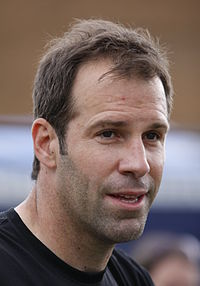
Back غريغ روزيدسكي Arabic جريج روزيدسكى ARZ Грег Руседски Bulgarian Greg Rusedski Czech Greg Rusedski Danish Greg Rusedski German Greg Rusedski Spanish گرگ رودسکی FA Greg Rusedski Finnish Greg Rusedski French
 Rusedski in 2014 | |
| Country (sports) | |
|---|---|
| Residence | London, England, UK |
| Born | 6 September 1973 Montreal, Quebec, Canada |
| Height | 6 ft 4 in (1.93 m) |
| Turned pro | 1991 |
| Retired | 7 April 2007 |
| Plays | Left-handed (one-handed backhand) |
| Prize money | $8,944,841 |
| Singles | |
| Career record | 436–287 |
| Career titles | 15 |
| Highest ranking | No. 4 (6 October 1997) |
| Grand Slam singles results | |
| Australian Open | 4R (2001) |
| French Open | 4R (1999) |
| Wimbledon | QF (1997) |
| US Open | F (1997) |
| Other tournaments | |
| Tour Finals | RR (1997, 1998) |
| Grand Slam Cup | W (1999) |
| Olympic Games | 3R (1996) |
| Doubles | |
| Career record | 62–53 |
| Career titles | 3 |
| Highest ranking | No. 63 (19 June 1995) |
| Grand Slam doubles results | |
| Australian Open | 2R (1995) |
| French Open | 1R (2006) |
| Wimbledon | 2R (1994) |
| US Open | 2R (1994) |
| Team competitions | |
| Davis Cup | World Group 1R (1999, 2002) |
Gregory Rusedski (born 6 September 1973) is a British former professional tennis player. He was the British No. 1 in 1997, 1999 and 2006, and reached the ATP ranking of world No. 4 for periods from 6 October 1997 to 12 October 1997 and from 25 May 1998 to 21 June 1998.[2]
In 1997, he was the US Open finalist, which led to him receiving the BBC Sports Personality of the Year Award and the ITV Sports Champion of the Year Award. Also, he scored 30 wins and 13 losses with the Great Britain Davis Cup team. Along with erstwhile rival and teammate Tim Henman, Rusedski was credited with beginning a renaissance in British men's singles tennis from the doldrums of the eighties and nineties, reaching a grand slam final and returning Great Britain to relevance in the Davis Cup, progress that would eventually be brought to fruition by Andy Murray.
- ^ "Greg Rusedski | Bio | ATP World Tour | Tennis". ATP World Tour. Retrieved 15 August 2016.
- ^ "Greg Rusedski: Player Profile". atpworldtour.com. Retrieved 13 June 2014.